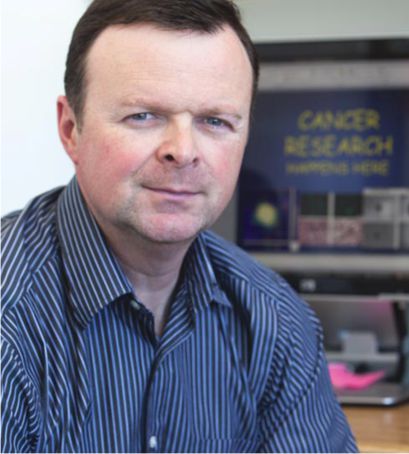Queen’s University researchers have gained recognition for the discoveries they have made in medicine, engineering, and the sciences; innovations that have improved the lives of people around the world. To make sure that the university and the public continue to benefit from this work, Queen’s Partnerships and Innovation (QPI) promotes the discoveries of university researchers who have assigned their intellectual property to Queen’s and whose work is ready for licensing and commercial application. QPI leads the commercialization processes, including the protection of the intellectual property, the creation of strategies to further its development, the search for funders, partners, and licensees, the negotiation of terms, the management of relationships, the collection of licensing and royalty revenues, and their disbursement to inventors.
Imagine a treatment that could stop a cancer dead in its tracks.
That’s probably a long way off. But research that Queen’s University’s Andrew Craig is doing today may help make that a reality.
The key, says Professor Craig, both Director of and researcher at the Queen’s Cancer Research Institute, is to find targets that can stop metastasis, the rapid, frequently fatal spread of cancer to other parts of the body. He believes a way to do this is by developing specific inhibitors of an enzyme called Matrix metalloproteinase-14. MMP-14, as it is commonly called, normally plays a role in the breaking down of the “extracellular matrix” -- the “scaffolding” so to speak, that surrounds cancer cells within tumours. This is an essential function in our bodies. Unfortunately, in cancerous cells, MMP-14 plays a role in spreading the cancer through the body. MMP-14 is found both within the cell and also on its surface, and it is the surface MMP-14 that aids the spread of cancer.

Researchers have attempted to prevent the activity of MMP-14 on cancerous cells using small molecule inhibitors, says Dr. Craig, but these weren’t very specific and had off-target toxic effects. Instead, he reasoned that a better way to thwart MMP-14 would be by discovering and developing an antibody that would specifically inhibit MMP-14 on tumours and prevent cancer cells from spreading.
To advance his hypothesis, Dr. Craig began working with the Toronto Recombinant Antibody Centre (TRAC). Founded by Dr. Sachdev Sidhu, TRAC is part of the University of Toronto’s Donnelly Centre.
“What they brought to the project,” says Dr. Craig, “was a vast library of different antibodies.”
To use these, Dr. Craig and his researchers “prepared a version of the MMP-14 that is displayed on the surface of cancer cells and then screened this library in collaboration” with TRAC. The goal: to find those that bound MMP-14, and screen for inhibitory antibodies. Work began in 2014, with initial funding provided by the Canadian Cancer Society.
“We found that some of the antibodies that we screened were quite inhibitory of MMP-14’s functions on the cancer cells,” he says. “They worked quite well to inhibit the movement of cancer cells in culture models, but we were also quite excited that they actually inhibited the metastasis of these breast tumours in the animal model as well.” Based on the results, he says, “We were able to publish our first paper on this topic in 2017.”
Queen’s Partnerships and Innovation has been involved almost since the beginning. Says Dr. Craig: “We started to talk to QPI about the very real possibility that we might end up with some intellectual property (IP) that had value.”
QPI was able to work on that as well as the more complex job of working out how this IP would be shared with the group in Toronto, a necessary undertaking when two universities are involved.
“Certainly not something I could have worked out on my own,” says Dr. Craig. QPI’s Michael Wells has also been helpful with, as Dr. Craig puts it, “just surveying the landscape.” A process, he says, that asks. “What is the marketplace for this, where is the competition at?” Initially, Dr. Craig had seen his MMP-14 work as focusing on breast cancer.
The challenge, says Dr. Wells, is “the high level of competition and the significantly large number of products in development.” Dr. Wells encourages researchers to ask, “Are there other disease areas where there is a pressing, unmet need?” The disease need not even be cancer. The work that Dr. Craig is doing could have applications in fighting a range of diseases. One idea they are currently exploring involves conjugating (that is, joining) the MMP-14 antibodies with a toxin (Dr. Craig is already involved in developing these in a separate project) that might improve the antibodies’ effectiveness. There is still work to be done, and Dr. Craig will continue to test optimized antibodies as they become available at TRAC.
Readers interested in licensing or learning more about the technology Dr. Craig has developed should contact Michael Wells at michael.wells@queensu.ca.
 About Vice-Principal Research
About Vice-Principal Research